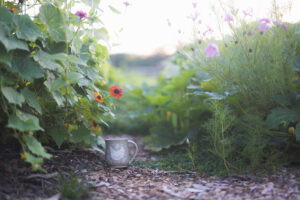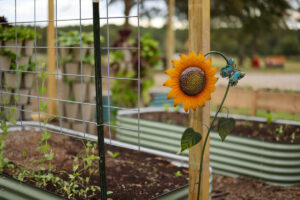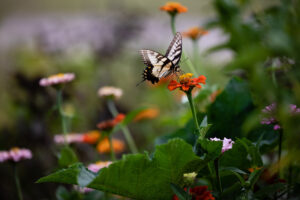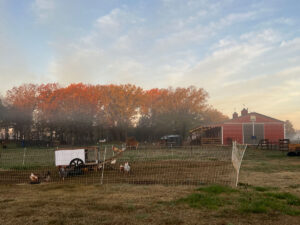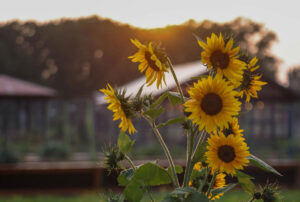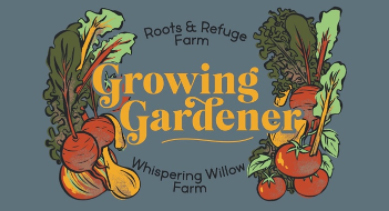Learn to make your own compost tea and fertilize your garden for incredible growth and healthy soil filled with life.
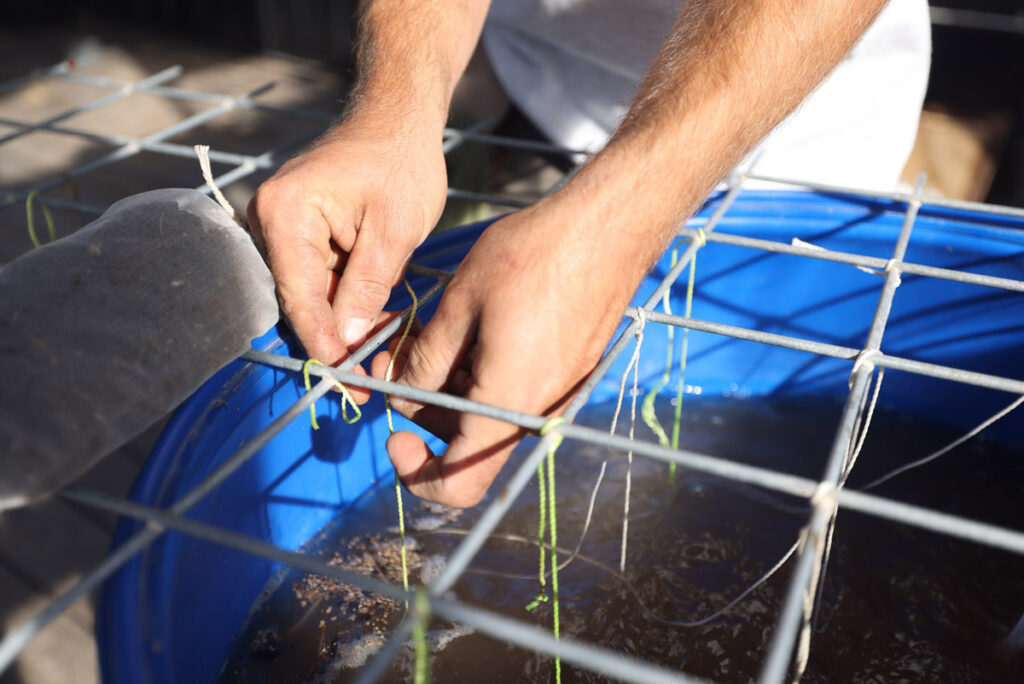
At the beginning of my first garden here in South Carolina, we ended up getting contaminated soil with what we believe to be aminopyralid. This is an herbicide that's used to control broadleaf weeds.
Instead of removing all the soil and starting over, we began the process of rehabilitating our soil. The first thing we did was to make compost tea out of worm castings.
A lot of people focus on feeding their plants instead of feeding the soil. You can always feed your plants, but if you don't feed your soil and build up a strong soil biome, you'll never be able to grow strong, productive plants without plant food.
Healthy soil equals healthy plants.
Why Make Compost Tea?
Compost tea is a fertilizer for your plants and soil. But more than that it acts like a probiotic for your garden. Just like we all need a diverse microbiome in our gut to be healthy, plants need diverse and healthy soil. Compost tea can help.
Microbes are essential to healthy soil. Many people think they have poor soil, when in reality, their soil is just devoid of life (or microbes).
Compost tea is a fantastic way to add life back into the soil.
Furthermore, plants that are treated with compost tea are much more disease resistant and will be able to handle harsher weather conditions as well. Check out this post for more on organic pest control in the garden.
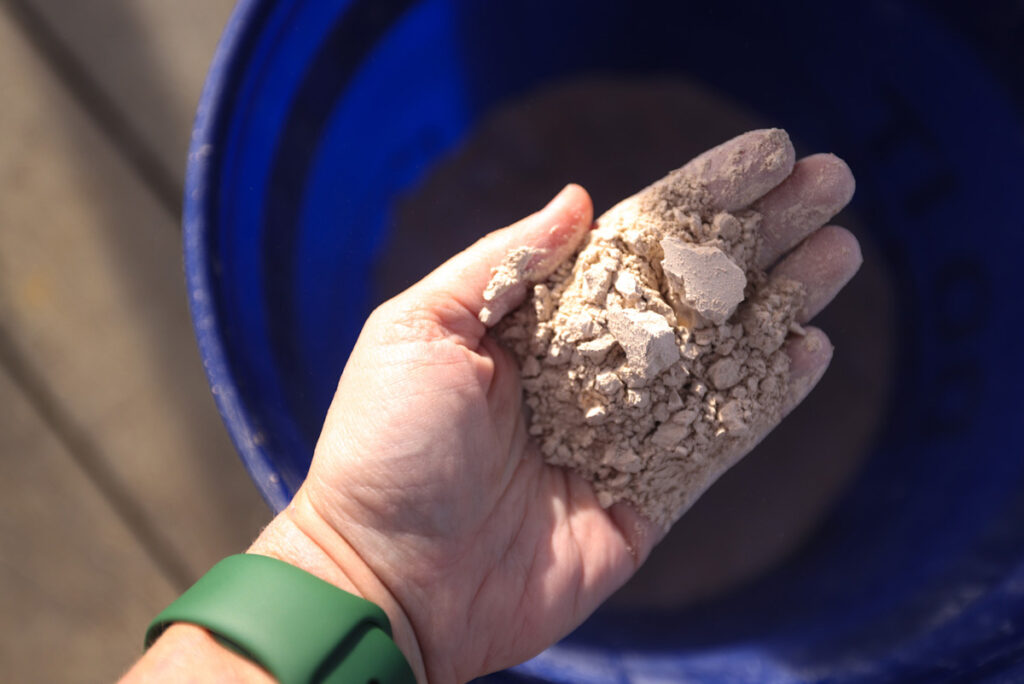
What is Compost Tea Made With?
The main ingredient in compost tea is worm castings. Worm castings are filled with microbes and, when mixed with aerated water, those microbes will multiply a thousand-fold.
You can take a 50/50 mixture of compost tea and water and drench your garden with it and visibly see plants that were yellow and struggling green up within a matter of hours. It's truly amazing stuff!
My friend Wil is making compost tea (and graciously teaching all of you at the same time) so he can do a biochar experiment. If you'd like to follow him and that project, check him out on YouTube at Honeybee Hollow Gardens.
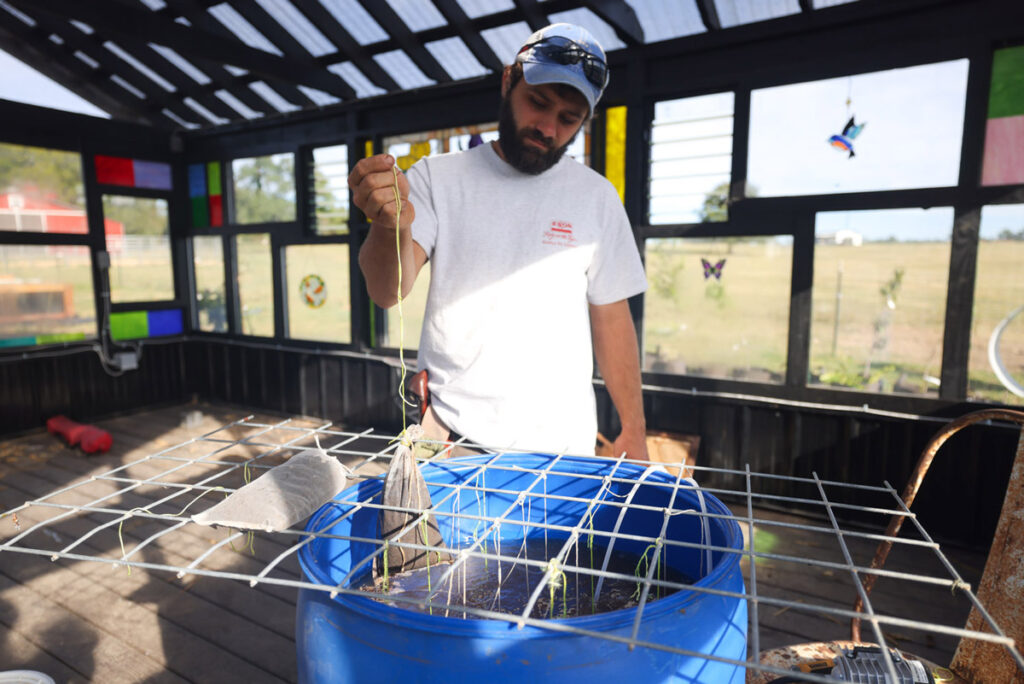
What is Better, Compost or Compost Tea?
Both are great, and I'm not sure one is better than the other. They're different!
Compost is great for building up a healthy soil ecosystem over time, and we love to make our own compost piles here on the farm. However, compost tea is an easy way to see quick results without having to tend to a compost pile for months at a time.
I love making compost tea because it's so scaleable. You can make a gallon of compost tea, or 50 gallons. Make enough for 100 square feet or 10,000 square feet.
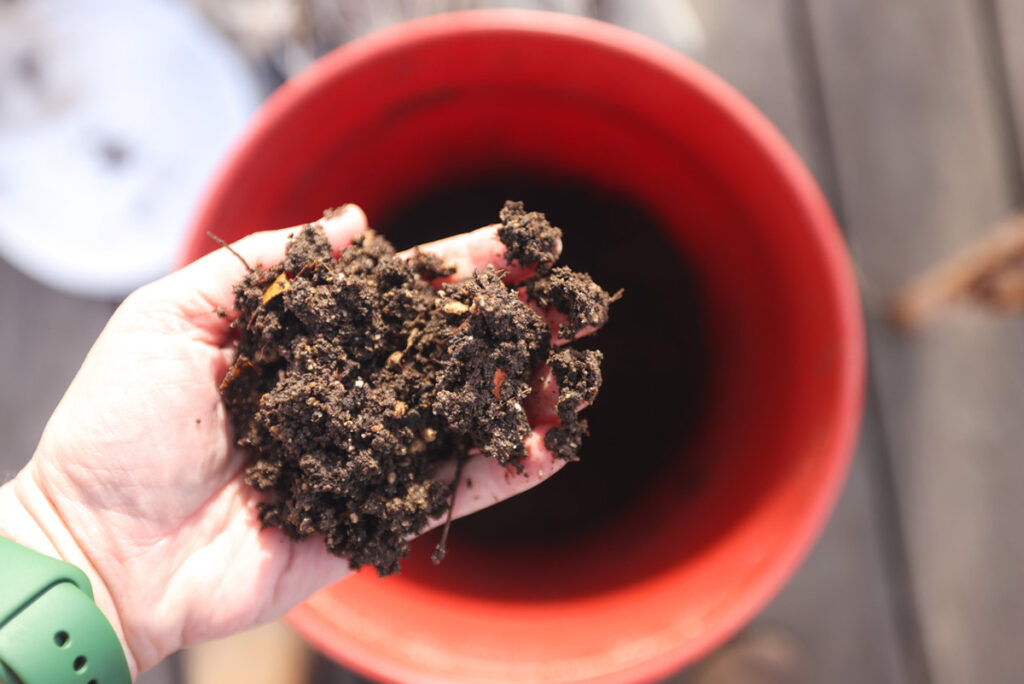
Where to Get Worm Castings
If you've never kept a worm farm before, you should definitely check out my friend Natalie's Worm Farming Course from Hey It's a Good Life. She's done an entire course on how to raise and keep worms and that course will really set you up for success.
In this post, you'll learn how to make compost tea from worm castings. If you aren't raising worms, you can also purchase worm castings for this recipe as well.
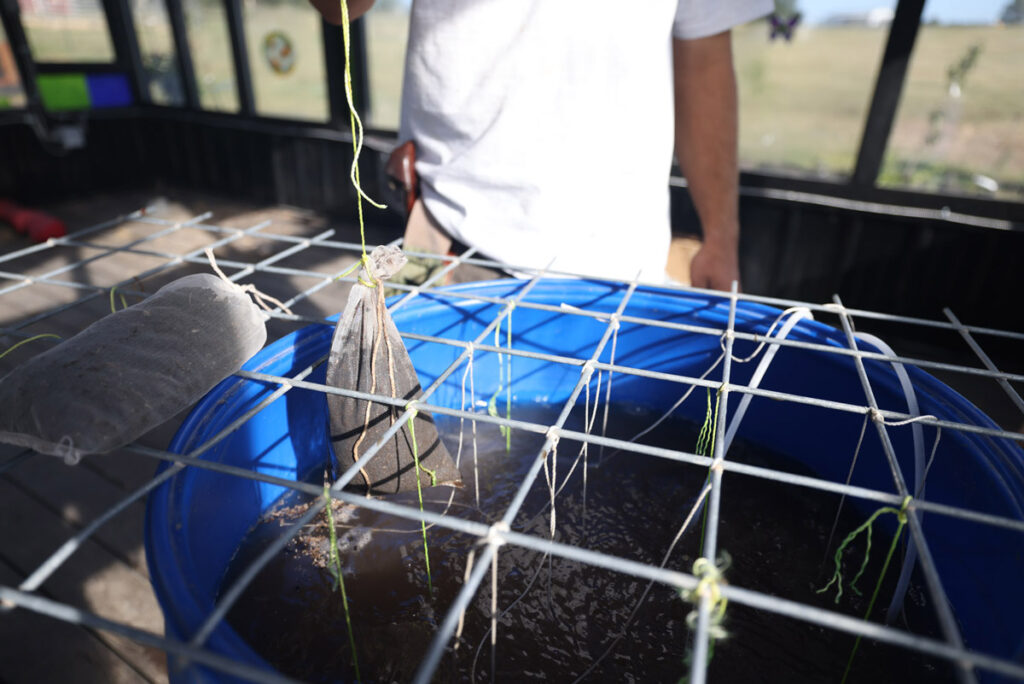
Does Compost Tea Burn Plants?
Compost tea can burn plants if not diluted enough. That's why we want to do a 50/50 mixture, so it's safe to use as a foliar and leaf spray on plants.
If you're putting compost tea directly on the soil and you have a pretty heavily mulched garden, you don't need to dilute the compost tea and there should be no threat of burning your plants.
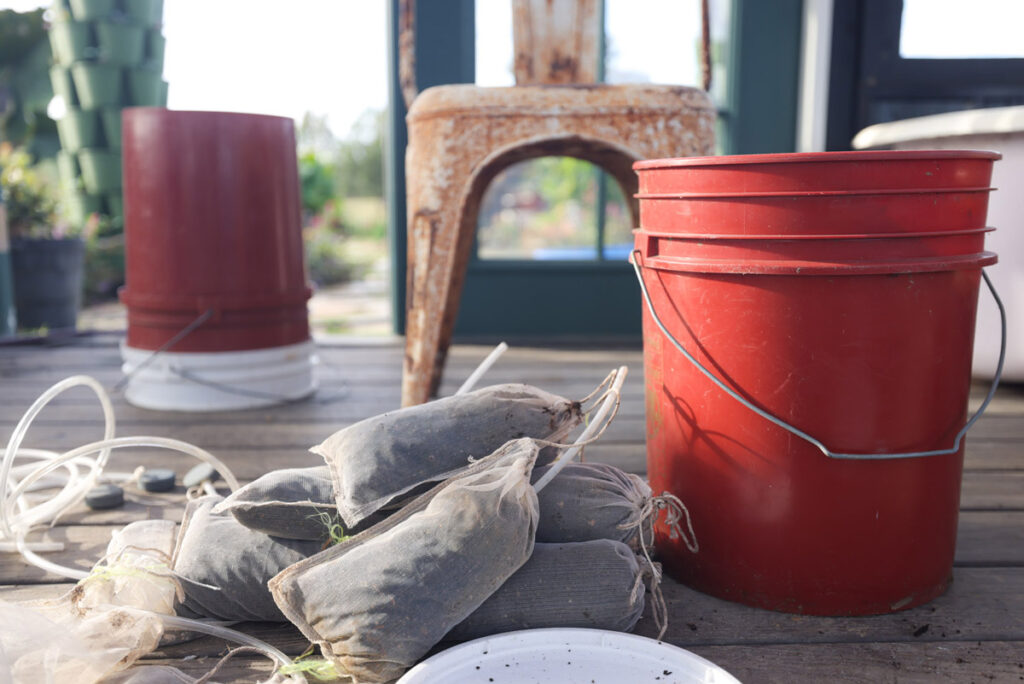
How Long Does Compost Tea Last?
If you make a compost tea you will want to use it within an hour of aerating it. As soon as you stop the aeration, the number of microbes will begin to diminish, so only make as much as you'll use at one time.
How Long Does it Take to Make Compost Tea?
Compost tea can be made in about 24 hours (longer if you need to let your water de-chlorinate – more on that below).
How Long Can My Compost Tea Brew?
If you can't use up all of your compost tea in one sitting, it's just fine to allow it to continue bubbling for a day or two until you're able to distribute it to your entire garden.
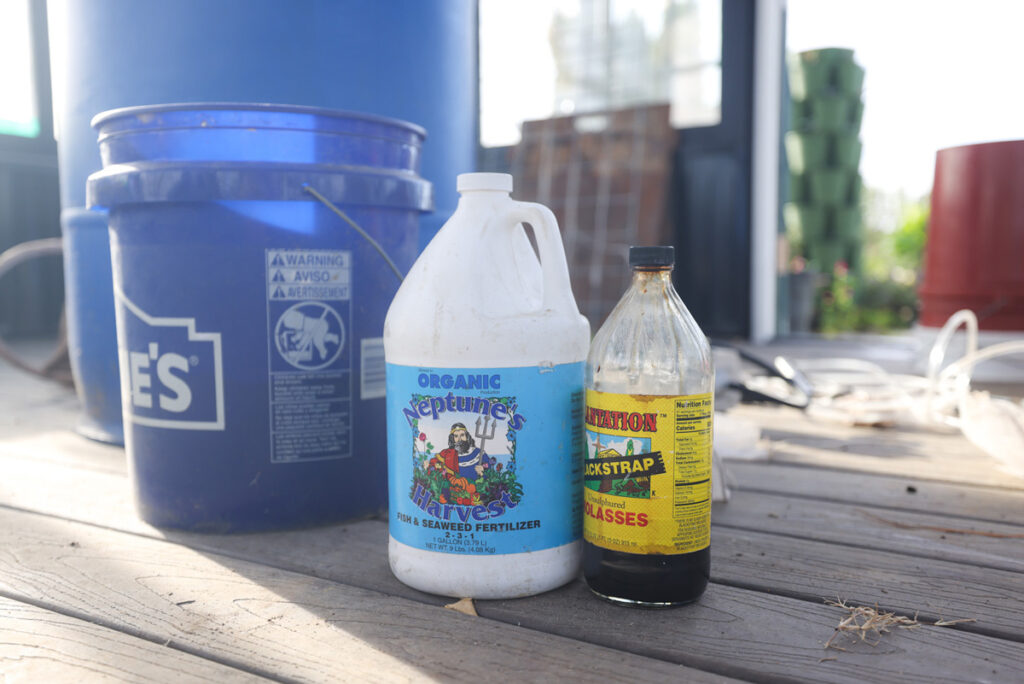
Should I Add Molasses to Compost Tea?
There are two camps when it comes to making compost tea with or without molasses. Wil shares that compost tea made with molasses is better for bacterial-dominated tea, whereas those without molasses are better for fungal-dominated tea.
Bacterial teas are better for annual systems where the soil will be getting disturbed yearly. Fungal teas are better for those areas with more perennial systems.
When is My Compost Tea Ready?
You will know your compost tea is ready to use when it smells neutral. The fish emulsion has a very fragrant smell, so once your compost tea has no odor at all, it's ready to use.
If your compost tea still has an odor, it either means it's not ready to use, or it's gone anaerobic.
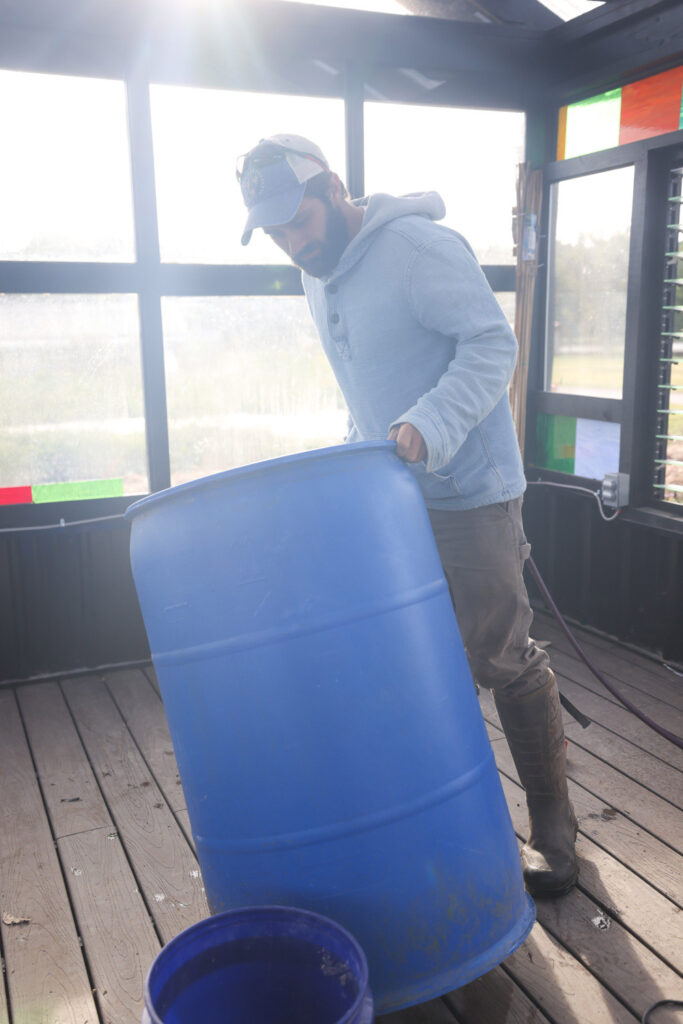
How to Make Compost Tea
Wil learned this method from Nature's Always Right's YouTube video on How to Make Compost and Worm Tea + Soil Food Web Recipe
We're making it in a 55-gallon barrel, but we'll also give the directions for making it on a smaller scale in a 5-gallon bucket.
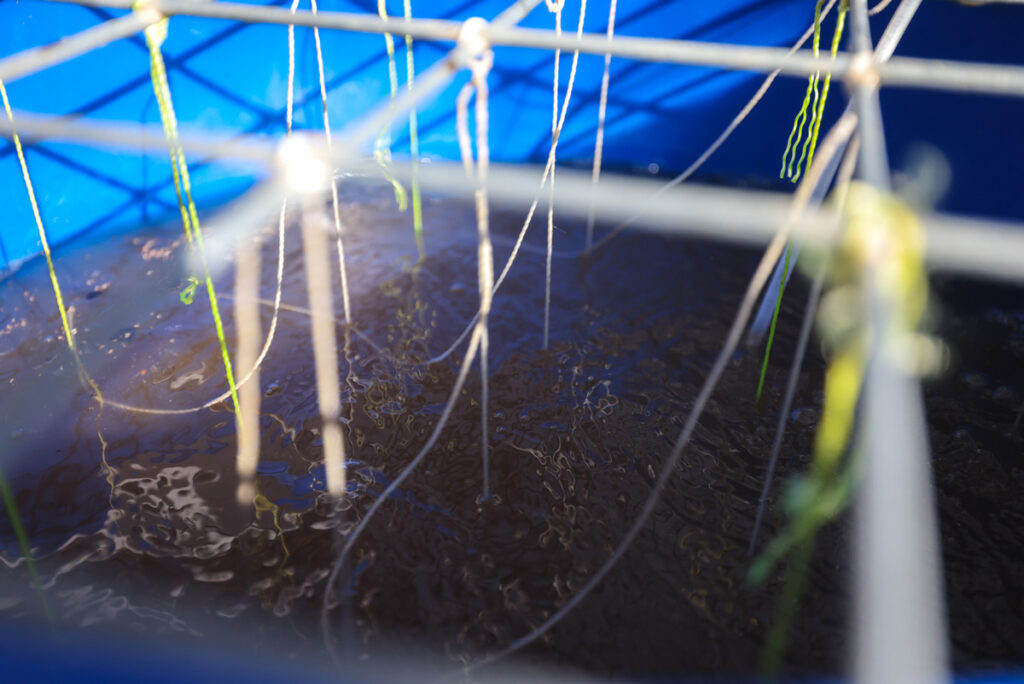
Supplies Needed
- 55-gallon barrel (or 5-gallon bucket) – Choose the right size vessel depending on how much compost tea you're making.
- Electro Magnetic Air Pump with Hoses and Air Stones (or an aquarium bubbler if using a 5-gallon bucket) – You can find these online or at many hardware stores.
- Strong Wire Rack – This is something that can lay across the top of the barrel or bucket that your compost tea bags can hang from.
- Worm Castings – You'll need 1.5-2 lbs of worm castings per 5 gallons of water. We used approximately 15 pounds for the 55-gallon barrel.
- Micron Filter Bags – We filled about 8 micron filter bags filled with worm castings. Scale up or down as needed.
- 2 Tablespoons Molasses – this is a sugar source for the microbes to eat. You can omit the molasses if you want to do a fungal-dominate compost tea. Use 1 teaspoon of molasses for a 5-gallon bucket.
- Fish Emulsion – 3 Tablespoons for a 55-gallon barrel, or 2 teaspoons for a 5-gallon bucket (I always use Neptunes Harvest Organic Fish Emulsion)
- Azomite – 1 cup Azomite for a 55-gallon barrel, or about 1.5 Tablespoons for a 5-gallon bucket. Azomite is used as a fertilizer, it's made up of minerals from volcanic soil and ash.
- Water – You will want to use well water or water that has been de-chlorinated. If you're using city water, de-chlorinate it by letting it sit without a lid for 24 hours before using it. (This is good to do the day before so it doesn't halt your project.)
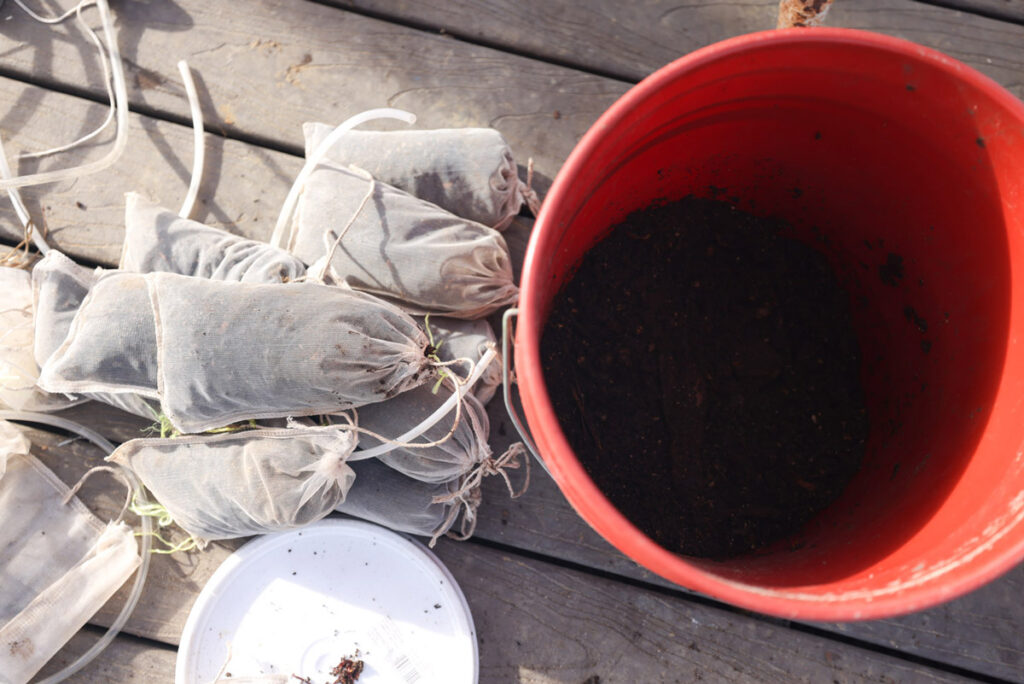
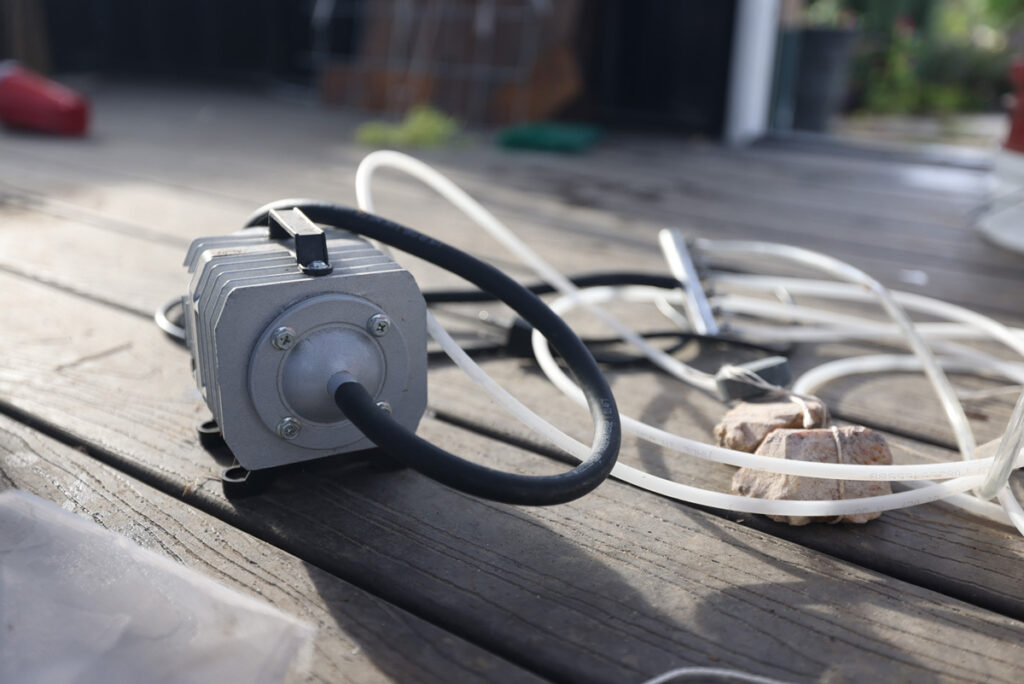
Directions
- Be sure you gather all your supplies and have your pump set up and ready before you begin.
- Fill micron bags with worm castings and tie them to secure.
- Add Azomite to the barrel or bucket and enough water to dilute the Azomite completely. It's important to dilute it completely, so it doesn't gum up and plug your air stones.
- In another bucket, add molasses and fish emulsion with enough water to stir in and dissolve the molasses. It will be very fragrant, so making it in a well-ventilated area is recommended!
- Add the molasses and fish emulsion mixture into the Azomite mixture and add water, leaving about 6-inches of space at the top of the barrel (or a few inches if using a 5-gallon bucket).
- Submerge air stones (or fish tank bubbler) and place them at the bottom of the barrel. Turn on the air pump until you have a nice bubble going. It doesn't have to be bubbling like crazy, you just want a good amount of air going through the water.
- Tie your compost tea bags to the rack and lower them into the water. Make sure the tea bags aren't pressing up against the edge of the barrel or bucket. You want air to flow all around them.
- Allow to “steep” or “brew” for 24 hours.
- Dilute compost tea with equal parts water and use immediately.
Pro Tip: It's ideal for making compost tea in about a 75-80° F environment because the microbes thrive in those temperatures. But do the best you can! Don't let the temperature be what keeps you from making compost tea at home. Wil mentions that if the temperature is dropping below about 50° F, you may not be successful because the microbes may not thrive and multiply.
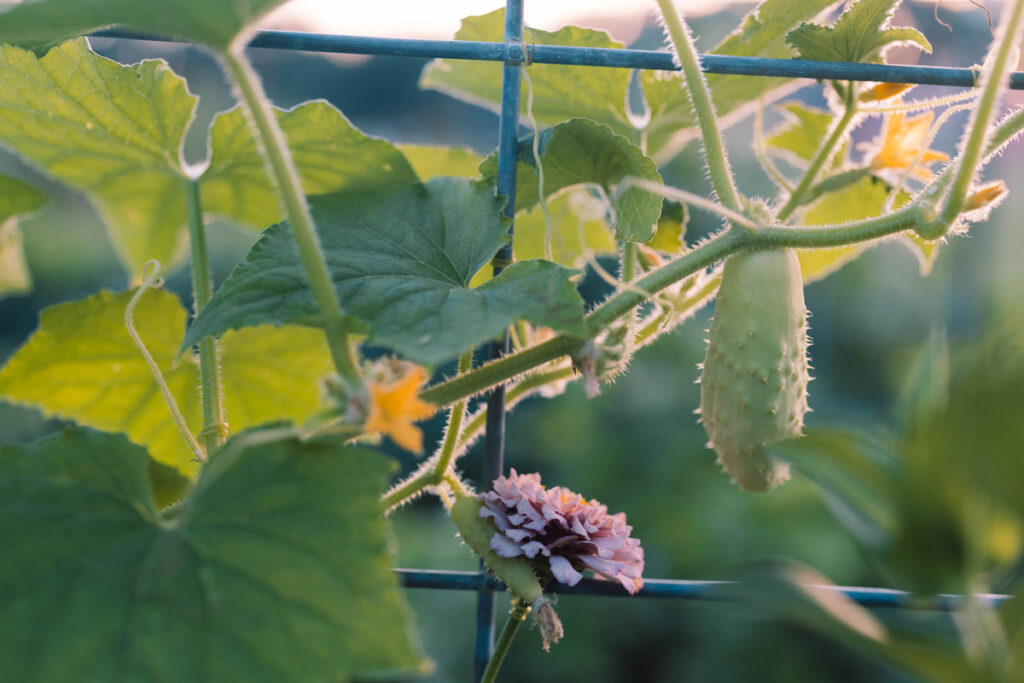
Using Compost Tea
Dilute the compost tea with equal parts water. You don't have to get too fussy about this ratio. Just eyeball it. Your garden will benefit even if your ratios aren't quite exact.
Spray the plants, leaves, soil, everything!
Scale the recipe below up or down according to your needs. Just remember, if you don't use it within 24 hours, it will become anaerobic and will not be as full of life as before.
Did you make your own compost tea? We'd love for you to leave a star rating of this tutorial on the instruction card below. Then be sure to snap a photo of your tea and tag us on social media @roots_and_refuge so we can see!
More Posts You May Enjoy
- How to Start a Compost Pile
- Organic Pest Control in the Garden
- Garden Planning Basics (How to Plan Your Garden)
- Growing A Garden From Grocery Store Food
- How to Build a Raised Garden Bed (On a Budget)
- $7 Kiddie Pool Raised Garden Bed (& Other Cheap Container Garden Ideas)
- How to Build a Garden Arch Trellis or Garden Arbor (for $30!)
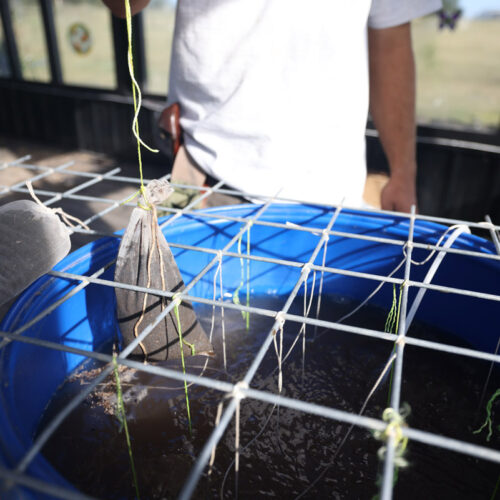
Compost Tea
Equipment
- 1 55-gallon barrel or 5-gallon bucket
- 1 Electro Magnetic Air pump
- 1 Strong Wire Rack
- 1 5-gallon bucket additional bucket for mixing
Ingredients
- 15 lbs worm castings or 1.5-2 lbs per 5 gallons of water
- 8 Micron filter bags
- 2 Tablespoons molasses or 1 teaspoon for 5 gallons
- 3 Tablespoons fish emulsion or 1.5 teaspoons for 5 gallons
- 1 cup Azomite or 1.5 Tablespoons for 5 gallons
- water non-chlorinated
Instructions
- Be sure you gather all your supplies and have your pump set up and ready before you begin.
- Fill micron bags with worm castings and tie to secure.
- Add Azomite to the barrel or bucket and enough water to dilute the Azomite completely. It's important to dilute it completely, so it doesn't gum up and plug your air stones.
- In another bucket, add molasses and fish emulsion with enough water to stir in and dissolve the molasses. It will be very fragrant, so making it in a well-ventilated area is recommended!
- Add the molasses and fish emulsion mixture into the Azomite mixture and add water, leaving about 6-inches of space at the top of the barrel (or a few inches if using a 5-gallon bucket).
- Submerge air stones (or fish tank bubbler) and place them at the bottom of the barrel. Turn on the air pump until you have a nice bubble going. It doesn't have to be bubbling like crazy, you just want a good amount of air going through the water.
- Tie your compost tea bags to the rack and lower them into the water. Make sure the tea bags aren't pressing up against the edge of the barrel or bucket. You want air to flow all around them.
- Allow to "steep" or "brew" for 24 hours.
- Dilute compost tea with equal parts water and use immediately.
Video
Notes
- You can add undiluted compost tea directly to garden soil that's well mulched. If applying compost tea to plants or delicate roots, it's best to dilute 50/50 with water.
- Use compost tea within 24 hours of brewing. If you have unused compost tea, it will become anaerobic and will not be full of life, therefore it won't have the same benefits or effects when added to the garden.

